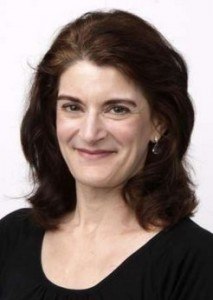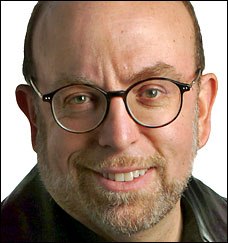 New York Times critic Manohla Dargis, who is not Jewish, but to use her words, “I am married to a Jewish man, so I am sensitive to the representation of” … how jewish Hollywood is. It doesn’t stop her from complaining that Hollywood’s movies are too “white”.
New York Times critic Manohla Dargis, who is not Jewish, but to use her words, “I am married to a Jewish man, so I am sensitive to the representation of” … how jewish Hollywood is. It doesn’t stop her from complaining that Hollywood’s movies are too “white”.
Steve Sailer quotes Dargis, reacts to her misdirected distaste like it’s a big joke, and tosses in his own sneer at “hillbilly” “white trash” for good measure. Sailer likes things like this. He calls attention to White/jew double standards without identifying them as such. Then instead of a sober lecture about “human biodiversity” he serves up a comedy schtick.
The search result in the first link in this post has been scrubbed of the blurb concerning Dargis’ jewish sensitivities, but the short synopsis that remains is relevant in its own right. Project MUSE – Shofar: An Interdisciplinary Journal of Jewish Studies – The Fockerized Jew?: Questioning Jewishness as Cool in American Popular Entertainment, by Samantha Baskind:
This essay examines the recent upsurge in overt Jewish identity in American popular culture, using the film Meet the Parents (2000) and its sequel Meet the Fockers (2004) as a case study to demonstrate how the Jewish Jew is no longer avoided and when portrayed does not fall victim to stereotyping. While looking at these two films together, I describe a broader evolution in media from the de-ethnicized Jew, and for that matter the de-ethnicized Jewish actor, to performers flaunting (and thereby celebrating) Jewishness in a Christian-centric society that has found acceptance of the Other. The paper also questions what about Jewishness is cool and describes how viewer subjectivities influence the perception of coolness.
The “upsurge in overt jewish identity” continued with Little Fockers (2010), which Dargis reviewed:
Part of what made the first movies work as well as they did — “Meet the Parents” hit in 2000, and its sequel, “Meet the Fockers,” followed four years later — was the cultural clash that dare not fully speak its name. Initially, the series only broadly winked at the reasons for Jack’s slow-burning tsuris. Was that a bagel in Greg’s pocket, or was he just glad to see his shiksa girlfriend and then wife, Pam (Teri Polo)? But when the second movie brought in Barbra Streisand and Dustin Hoffman to play Greg’s parents, any residual anxiety about the characters’ nominal cultural differences gave way to the spectacle of two legends playfully batting around the Jewish stereotypes that the stars themselves struggled against and transcended.
What Dargis calls “the cultural clash that dare not fully speak its name”, and then dances around in ewjay odecay, speaks its name quite clearly in jewish studies journals. Jews may fault everybody else for regarding them as the Other, but the truth is they freely discriminate themselves from “whites” whenever they like. When Whites distinguish ourselves from jews they act as if we’re morally or mentally defective.
Here are three more reviews of the Fockers series, with the common thread being an acute jewish awareness of the distinction between jews and Whites.
Meet the Parents: Little Fockers | SabDesi paints the Focker culture clash as one-sided “anti-semitism”:
There has always been some interesting cultural tension behind these films, an argument between race and power. Jack Byrnes (no relation, thank God) is a White Anglo-Saxon Protestant male force entering the domestic arena. That’s why his character worked for the CIA for 34 years, including 19 months in a Vietnamese prison camp; he is American power brought to bear on the enemy within – the schlemiel who is stealing his princess.
Greg Focker’s fool is a very old kind of Jewish comic character – a Jew who fears life among the Gentiles. Ben Stiller is its foremost practitioner in modern movies. It was clear in the first movie that a large part of Jack’s objection to Greg was anti-Semitism, along with his contempt for his caring profession. “Not a lot of men in your profession, are there Greg?” he asked in the first movie.
The second movie went further into this anti-Semitism, with Dustin Hoffman and Barbra Streisand as Greg’s parents, Bernie and Roz. They were hippies from Florida – a tad embarrassing but open-hearted. Roz was a flamboyant TV sex therapist; Bernie’s job was to smother everyone with kisses, especially Jack. The contrast was obvious but effective: cold eastern Protestant establishment versus warm kosher humanity. Puritans versus emigrants: no wonder Spielberg was interested.
Dannielle Blumenthal, self-described “Professional communicator fascinated by all things branding”, explains How the “Little Fockers” Brand Makes Sexism, Racism, and Anti-Semitism OK:
While the character of Roz Focker (Bernie’s wife) is supposed to represent liberated femininity, she is also portrayed as emasculating, pushy (recall the stereotype of the “pushy Jew”), and even a bit crazy. The message being that “women’s libbers” are all three of these things.
In contrast, Pam Focker (Greg’s wife) and Dina Byrnes (Jack’s wife) are portrayed as “normal and stable,” wives who know their place, don’t make “trouble” (e.g. emotional demands), and support their husbands endlessly no matter how crazy and possibly even unfaithful they act.
It is precisely Pam’s endless supportiveness, as well as her stereotypical Barbie-like beauty, that leads her to be portrayed as the “one true love” of Kevin, who pursues other women, but can never forget her. The most that Pam asks of Greg is to check on the facepainter for the kids’ upcoming birthday party, and when he doesn’t do it, she simply sighs and leaves the room.
In terms of racism, there were very few African-Americans in this movie at all, much less any in power. I saw one character playing a patient, one playing an incompetent nurse, and another on the subway train as an “extra.” Do the Fockers and the Byrnes not have any African-American friends, associates, customers, and so on? Why was the movie so “White?” I’m not saying that movies have to be advertisements for diversity but the Caucasian-ness of the movie seemed extreme.
There is another example of anti-Semitism besides the writers’ antipathy toward Roz (and Bernie) but I don’t want to give away that part of the plot.
Clearly though this is very much a movie poking fun at “WASP” culture and the difference between it and the movie’s Jewish characters. It seems like WASPiness is “idolized,” but also seen as dysfunctional, whereas Jewish culture is a kind of corrective. (Interestingly I was reading the book “Stuff White People Like” yesterday and it had a similar attitude toward WASPiness. It was also hilarious.)
Blumethal is hyper-sensitive to anti-jew slights, but like Sailer anti-White slights make her laugh.
The Fockers Trinity, by Joan Alpert:
Despite the silliness, the movies portray the shifting role of Jews in American culture. Jews have previously been portrayed as outside the majority culture; their masculinity is different than the norm; they are neurotic, weak and effeminate—a continuation of the anti-Semitic tradition that questioned Jewish maleness, says Daniel Itzkovitz, director of American Studies at Stonehill College in Easton, Massachusetts and contributor to the 2006 Jewish Identity in Postmodern American Culture. The movies give an “unwholesome perception of Jews,” claims one commentator, Rabbi Daniel Lapin, an Orthodox rabbi in California, by portraying them as “heinous caricatures.”
Fockers’ writer Joe Hamburg however, defends his films’ non-Jews. They “are not anti-Semitic,” he says; it’s just that Greg “feels out of place” in a WASP world in which bulletproof Kevlar surrounding the family van is the answer to paranoia, and lie detector tests and sodium pentathlon injections are the means to truth. Life is serious. Pam warns Greg, “Humor is entirely wasted on my parents.”
Basically, the WASP, Jack, is a jerk and the Jew, Greg, is a schlemiel, and the schlemiel wins. Actually, Greg is “a post modern schlemiel,” says Itzkovitz. Although he has the attributes of the stereotypical nerdy fumbler, “American society is now identifying with him.” He adds: “Non-Jews as well as Jews are feeling unsettled in the 21st century.” They realize they are not all-powerful, like Rambo, but anxious and insecure like Greg, whose warmth, decency and caring attract Pam.
There you have it. The professional jewish bigots say, “hey, your movies are anti-jew”. The writer answers, “nope, anti-WASP”.
“[T]he shifting role of Jews in American culture” has been to steadily displace and dispossess Whites. The jew schlemiels win. The White jerks lose. That’s how and why movies like the Fockers get made. That’s why Hollywood is the way it is.
UPDATE 15 Feb 2011: Danielle “Hollywood Jew” Berrin and friends lift the veil on an Oscar-nominated “white” film, Aaron Sorkin’s The Social Network, which they see as a jewish production with a central jewish theme.
Who does Aaron Sorkin really hate? | Jewish Journal:
While it is true that women in general do not shine in “The Social Network,” the critique is misguided, because Sorkin is quite specific as to which kind of women he is referencing, when he references them at all — and they come in two forms: Asian Americans and Jews. According to a surface reading, neither gets a pretty portrait; Asian women are depicted as attractive and easy, and Jewish women are brawling shrews.
Jewishness, in general, is a characteristic the fictional Zuckerberg and his friends are desperate to escape. At the Caribbean Night party at the Alpha Epsilon Pi house, one of Zuckerberg’s friends wryly remarks: “There’s an algorithm for the connection between Jewish guys and Asian girls: They’re hot, smart, not Jewish and can dance.” Sorkin would have us believe that, in the eyes of some Jewish men — or at least those run-of-the-mill Harvard scholars — one of the best things about an Asian woman is that she isn’t a Jewish woman. And in Sorkin’s story, Asians get bonus points for performing oral sex in public bathrooms.
“That’s not what you’re going to get from an Erica,” said Olivia Cohen-Cutler, referring to the film’s only female Jewish character. Cohen-Cutler, a senior executive at ABC, is the chair of Hadassah’s Morningstar Commission, which devotes attention to images of Jewish women in the media. While most are decrying the film’s treatment of women, Cohen-Cutler sees something different in the character Erica Albright.
In the film’s opening scene, the fictional Zuckerberg is on a date with Erica, who is pretty, sophisticated and exquisitely articulate. While trying to woo her, an arrogant and socially inept Zuckerberg winds up insulting her every which way, which prompts Erica to unequivocally reject him: “You’re going to be successful and rich. But you’re going to go through life thinking that girls don’t like you because you’re a tech geek. I want you to know, from the bottom of my heart, that won’t be true: It’ll be because you’re an asshole.”
But her assertiveness, while well-founded, is met with a withering take-down. Zuckerberg avenges himself on his blog, her rejection providing the impetus for the creation of “Facemash” — the beginning of Facebook.
In real life, he wrote, “[So and so] is a bitch. I need to think of something to take my mind off her. Easy enough. Now I just need an idea.”
In the movie, the fictional Zuckerberg also insults the size of her breasts — and her last name, with a subtle dig about how her family changed their name from “Albrecht” to “Albright” — the only hint that she is Jewish, though it’s never explicitly confirmed.
“In one way [the Zuckerberg character] was saying, ‘She’s a fraud because her family did this and I’m not because I’m still Zuckerberg,’ “ Cohen-Cutler said in an interview. “What you saw throughout the film was a combination of Zuckerberg’s arrogance and self-loathing related to his otherness, which played into the ‘Jewish men hate Jewish women’ continuum.”
If this were pure fiction, it might sting a little less, but unfortunately it isn’t: Zuckerberg, who might be the most eligible Jewish bachelor in the world, met his real-life girlfriend, the Chinese American medical student Priscilla Chan, on erev Shabbat at an AEPi party during his sophomore year. (According to The New Yorker, friends speculate that they will marry.)
Liel Leibovitz, a writer for the online Jewish magazine Tablet and an assistant professor of communications at New York University, believes this is just more evidence that Hollywood is undeniably and irretrievably hostile to Jewish women.
“Being ‘Jewish’ in Hollywood means adhering to the stereotype, namely the smart and shlubby person who overcomes insecurities and applies wit to get ahead,” Leibovitz wrote via e-mail. “That, of course, is a stereotype that’s great for guys, but not too great for women. While Jewish men can fit right into the ‘Jewish’ niche in Hollywood’s arsenal of preconceived notions and crumbling clichés, Jewish women cannot.”
Indeed, Erica is punished, not for being the object of the male gaze, but for subverting it by being the only character in the movie who is actually smarter than Zuckerberg. Even if her rejection is the proper comeuppance for his immaturity and arrogance, it is Zuckerberg who becomes the hero, while Erica remains the heartless wench who wounded him.
Where does this animosity toward Jewish women come from?
“I am convinced by the theory that pins the blame largely on Jewish men,” Leibovitz wrote in his e-mail. His much-read 2009 article “Gentlemen Prefer Blondes” postulates that both Hollywood’s executives and its leading men prefer shiksas. Period.
In that vein, Sorkin’s script and its obvious aversion to Jewish women can be seen as an indictment of Jewish women nobody likes: the entitled Jewish American Princess and the overbearing Jewish Mother. But Erica Albright-Albrecht doesn’t fit into either of those stereotypes, even if she derives, in some way, from an archetypal Jewish feminine strength.
“I long for the day when a Jewish actress would play a Jewish character that’s just the normal, uncomplicated, unremarkable love interest who also happens to be Jewish,” Leibovitz said.
An uncomplicated Jewish woman? No wonder Sorkin doesn’t deliver. He seems, instead, ambivalent about them. He can’t stand the stereotypical figures (either on screen or from his own life), but he is also trying to imagine something different. So while Erica is reproved for her boldness, it is Zuckerberg who ends up endlessly longing for her, and an ideal that doesn’t really exist.
I suppose it’s asking Hollywood too much for two smart, good-looking Jews to run off into the sunset together. Or at least, in this case, to Silicon Valley.
“It’s too bad that this movie, which is really a testament to the brilliance and single-mindedness of someone, had to flip the bird to being Jewish,” added Cohen-Cutler, who admitted she loved the movie regardless.
Too bad, indeed. The real world is full of Jewish women whose qualities run contrary to Hollywood stereotypes. Which leads me to believe that it isn’t Jewish women that are the problem; it’s that Jewish men like Mark Zuckerberg and Aaron Sorkin are hanging out with the wrong ones.
Jews like Berrin, Cohen-Cutler, and Leibovitz are obsessed with jewishness and jewish interests. They are free to observe and opine on those interests from authoritative, paid positions without being pathologized or demonized as “racists”. They are exquisitely attuned to the most subtle cues of jewishness and what they perceive to be anti-jewish slights. They personify the “stereotype” of jewish women (and neurotic, weak, effeminate jewish males) as brawling shrews.
In contrast non-jews are not similarly obsessed or attuned, or at least are strongly discouraged from being so by the pathologization and demonization they would be subjected to should they behave in such a fashion. If they see The Social Network in racial terms at all they see it as a “white” film. The subtle slights remain, but can instead be seen through White-centric eyes as evidence that Hollywood, and the jewish shrews, are undeniably and irretrievably hostile to Whites. (The word “shiksa”, for instance, is an epithet on par with “kikess”. Jews feel comfortable using such insults, confident that non-jews either don’t understand or that those who do can be dismissed as “anti-semites” for objecting to it.)
Liel Leibovitz’s Gentlemen Prefer Blondes provides more of the same hyper-aware jewish analysis:
Since the dawn of American entertainment, Jewish women were largely rendered invisible, absent everywhere from burlesque to Hollywood to prime-time television. Instead, they watched as their sons and brothers and husbands became successful producers, directors, and impresarios, powerful men who then chose to populate their works with a parade of sexy, sultry shiksas who looked nothing like their female kin.
Note that for Berrin and Leibovitz jewishness is about kinship, who a jew chooses to mate with. They do not pretend it is about religion. Their double-talk is that jewish men run Hollywood but have used their power to bash jewish women. This is an implausible rationalization offered as a substitute for the more plausible view that the jews who run Hollywood initially rendered jewish men and women alike invisible. Now that their hated competitors the WASPs have been routed jewish domination is increasingly secure, not only in Hollywood, but media in general, not to mention law, finance, education, and politics. What we are actually subjected to is “the recent upsurge in overt Jewish identity in American popular culture” that Baskind takes note of. The large number of recent films starring Ben Stiller, Adam Sandler, and Seth Rogen come to mind.
Of course through jewish eyes everything is about jews. Every situation is evaluated based on what’s good or bad for jews. Jewish dominance is never complete enough. Jewish “stereotypes” are like so many jewish Moby-Dicks, haunting jews even as they obsess over them, sniffing them out and impotently trying to slay them. Though jews are fanatically self-aware and hyper-critical the blame is inevitably transferred to someone else. They change names and get nose jobs but only because “anti-semitism” compels them to do so. They make movies portraying WASPs as buffoons, but what they actually see is cryptic “anti-semitism” glorifying “shiksas”.
No matter how self-consciously White I try to imagine being I can’t ever hope to hold a candle to such bigotry.










